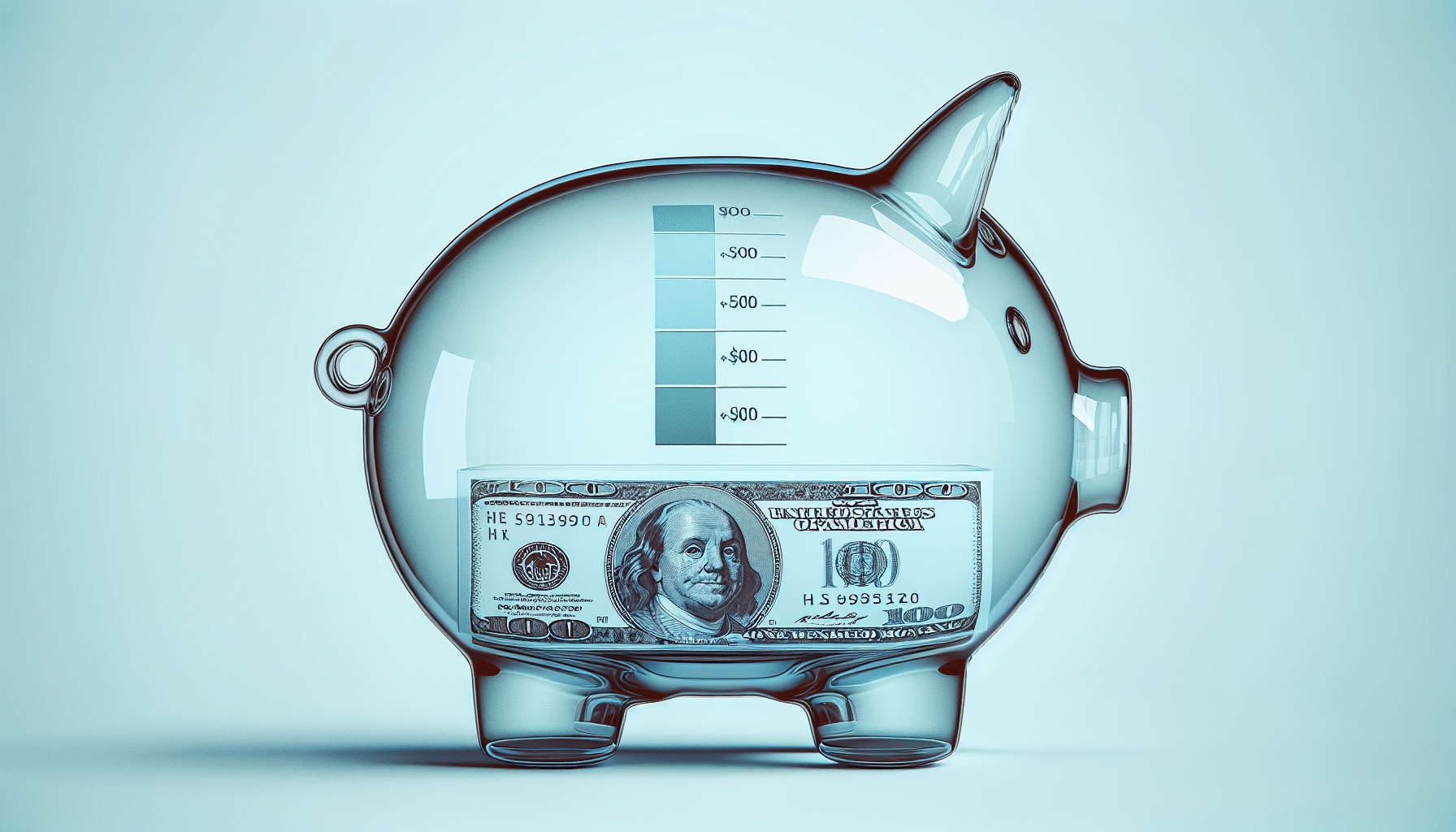Looking to save some extra cash when your paycheck feels stretched thin? Look no further! In this article, you'll find 25 valuable tips to help you make the most of your money. We understand that fixed expenses like rent, mortgage, and car payments can be tough to reduce, so we'll focus on other areas where you can cut back. From setting budgeting goals and tracking expenses to timing purchases strategically and taking advantage of discounts and deals, we've got you covered. We'll also share ways to get free stuff and have fun without breaking the bank. Plus, we'll discuss effective strategies for paying off credit card debt, refinancing your mortgage, lowering student loan payments, and more. So, let's dive in and start saving!
Budgeting and Tracking Expenses
Set budgeting goals
When it comes to managing your finances, it's important to start by setting budgeting goals. This will give you a clear direction and help you stay on track with your spending. Start by identifying your fixed expenses, such as rent, mortgage, and car payments. These expenses can be difficult to reduce, but by knowing exactly how much they cost you each month, you can plan your budget accordingly.
Next, take a look at your variable expenses, such as groceries, utilities, and entertainment. Set a realistic budget for each category based on your income and financial goals. Be sure to leave some room for unexpected expenses as well. By having a clear budget in place, you'll be able to see where your money is going and make adjustments as needed.
Track expenses
Once you have set your budgeting goals, it's important to track your expenses in order to stay on track. There are many different methods you can use to track your expenses, from simple spreadsheets to budgeting apps. Find a method that works best for you and stick to it.
Tracking your expenses will give you a clear picture of where your money is going and help you identify areas where you can cut back. By keeping track of your spending, you'll be able to see patterns and make adjustments as needed. This will also help you stay motivated and accountable to your budgeting goals.

This image is property of images.pexels.com.
Identify areas to cut back
After tracking your expenses for a few months, you'll start to see patterns and identify areas where you can cut back. Look for areas of your budget where you are spending more than you had intended or areas where you can make small changes to save money.
For example, if you notice that you're spending a lot of money on eating out, consider meal prepping at home instead. This can save you a significant amount of money in the long run. Similarly, if you find that you're spending a lot on entertainment, look for free or low-cost alternatives. There are often many free events and activities happening in your community that you can take advantage of.
By identifying areas to cut back, you'll be able to make small changes that can add up to big savings over time.
Strategic Purchases
Time purchases strategically
Making strategic purchases can help you save money in the long run. Instead of making impulse buys, take the time to research and compare prices before making a purchase. Look for sales and discounts that can help you get the best deal.
Additionally, consider timing your purchases strategically. Many stores offer discounts during certain times of the year, such as Black Friday or end-of-season sales. By waiting for these sales, you can often get the same item for a fraction of the price.

This image is property of images.pexels.com.
Take advantage of discounts and deals
In addition to timing your purchases strategically, take advantage of discounts and deals whenever possible. Sign up for newsletters and loyalty programs from your favorite stores to receive exclusive discounts and promotions. Look for coupon codes online before making a purchase, or use cashback apps to earn money back on your purchases.
You can also consider buying second-hand or refurbished items. Many times, these items are in great condition and can save you a significant amount of money. By being strategic with your purchases and taking advantage of discounts and deals, you can stretch your budget further and save money in the process.
Getting Free Stuff and Having Fun on a Budget
Find ways to get free stuff
Who doesn't love getting something for free? Luckily, there are many ways to get free stuff if you know where to look. One of the best places to find free items is online classifieds and community groups. People often give away items they no longer need for free, and you can find everything from furniture to electronics to clothing.
Additionally, keep an eye out for free events happening in your community. Many cities and towns hold free concerts, festivals, and other events throughout the year. These events can be a great way to have fun without spending much money.

This image is property of images.pexels.com.
Have fun without spending much money
When it comes to having fun on a budget, creativity is key. Look for low-cost or free activities that you enjoy. For example, instead of going to the movies, have a movie night at home with friends or family. Instead of eating out at expensive restaurants, have a picnic in the park or cook a meal at home.
Take advantage of nature and the great outdoors. Go for a hike, have a picnic, or spend a day at the beach. These activities are often free or low-cost and can provide hours of entertainment.
Remember, having fun doesn't have to mean spending a lot of money. With a little creativity and resourcefulness, you can have a great time without breaking the bank.
Dealing with Credit Card Debt
Develop a plan to pay off credit card debt
Credit card debt can be a major financial burden, but with a solid plan in place, you can take steps to pay it off and regain control of your finances. Start by listing out all of your credit card debts, including the balance owed and the interest rate.
Next, determine how much money you can allocate toward paying off your credit card debt each month. This might mean cutting back on expenses or finding ways to increase your income. Once you have determined your monthly payment, create a plan to pay off your debts in order of highest interest rate to lowest interest rate.

Use the debt snowball or debt avalanche method
There are two popular methods for paying off credit card debt: the debt snowball method and the debt avalanche method. The debt snowball method involves paying off your debts in order of smallest balance to largest balance, regardless of the interest rate. This can help you build momentum and stay motivated as you see your debts disappearing.
The debt avalanche method, on the other hand, involves paying off your debts in order of highest interest rate to lowest interest rate. While this method may not provide the same immediate satisfaction as the debt snowball method, it can save you more money in interest payments over time.
Choose the method that works best for you and stick to your plan. By making consistent payments and avoiding adding new charges to your credit cards, you can make significant progress toward paying off your credit card debt.
Exploring Mortgage Options
Consider refinancing your mortgage
If you're a homeowner with a mortgage, it may be worth considering refinancing your loan. Refinancing involves replacing your current mortgage with a new one, often at a lower interest rate. This can result in lower monthly payments and potentially significant savings over the life of your loan.
Before refinancing, it's important to evaluate your current interest rate and compare it to current market rates. If interest rates have dropped since you took out your mortgage, you may be able to secure a lower rate by refinancing. However, it's important to consider the costs associated with refinancing, such as closing costs and fees. Make sure the potential savings outweigh these costs before making a decision.

Take advantage of lower interest rates
In addition to refinancing, it's also important to take advantage of lower interest rates whenever possible. If you have a fixed-rate mortgage, refinancing may be the best option. However, if you have an adjustable-rate mortgage, you may be able to secure a lower rate by refinancing or by negotiating with your current lender.
Lowering your interest rate can result in significant savings over the life of your loan. This can free up extra money in your budget that you can use to pay down other debts or save for the future. Keep an eye on interest rates and consult with a financial advisor to determine the best course of action for your specific situation.
Lowering Student Loan Payments
Utilize programs like the Federal SAVE plan
Student loan payments can be a major financial burden, but there are programs available to help lower your monthly payments. One such program is the Federal SAVE plan. This plan allows borrowers to make payments based on their income, making it more affordable for those struggling to make ends meet.
To take advantage of the Federal SAVE plan, you will need to fill out an application and provide documentation of your income. Once approved, your monthly payments will be adjusted based on your income and family size. This can provide much-needed relief and allow you to better manage your finances.
Lower monthly student loan payments
In addition to utilizing the Federal SAVE plan, there are other strategies you can use to lower your student loan payments. One option is to refinance your student loans. Refinancing involves taking out a new loan to pay off your existing loans, often at a lower interest rate. This can result in lower monthly payments and potentially significant savings over the life of your loan.
Another option is to explore forgiveness or income-driven repayment programs. These programs can help lower your monthly payments and even forgive a portion of your debt after a certain number of years. Research the options available to you and consult with a financial advisor to determine the best course of action for your specific situation.
Saving on Groceries
Meal prep to save money on groceries
One of the biggest expenses for many households is groceries. However, by meal prepping, you can save a significant amount of money while still eating delicious and nutritious meals. Meal prepping involves preparing your meals in advance, typically for the week ahead.
Start by planning out your meals for the week and creating a grocery list based on those meals. By planning ahead, you can avoid impulse purchases and only buy the items you need.
Next, set aside some time each week to cook and prepare your meals. This could be on a Sunday afternoon or whatever day works best for you. Cook larger batches of food and portion them out into individual servings that can be stored in the fridge or freezer. This way, you'll have meals ready to go throughout the week and won't be tempted to order takeout or eat out.
Prevent impulsive spending
Another key to saving money on groceries is to prevent impulsive spending. This can be done by making a list and sticking to it when you go grocery shopping. Avoid going to the grocery store when you're hungry, as this can lead to making impulse purchases.
Additionally, try to avoid shopping at convenience stores or smaller, more expensive grocery stores. Instead, opt for larger supermarkets where you can find more affordable options. Consider buying generic or store brands instead of name-brand products, as these are often cheaper and just as good.
By meal prepping and being mindful of your purchases, you can significantly lower your grocery bill and save money each month.
Switching Banks for Cash Incentives
Consider switching banks
If you're unhappy with your current bank or looking to save money, consider switching banks. Many banks offer cash incentives for new customers, such as sign-up bonuses or promotional offers. These incentives can provide a nice boost to your savings or help you pay down debt.
Before making the switch, do some research and compare different banks and their offerings. Look for banks with low or no monthly fees, as well as competitive interest rates on savings accounts. Pay attention to any requirements for earning the cash incentive, such as maintaining a certain balance or setting up direct deposit.
Switching banks can seem like a hassle, but the potential savings and cash incentives can make it worthwhile. Take the time to evaluate your options and find a bank that aligns with your financial goals.
Take advantage of cash incentives
In addition to the potential cash incentive for switching banks, take advantage of other cash incentives whenever possible. Many credit cards offer sign-up bonuses or cash back rewards for spending a certain amount within a designated time frame. Take advantage of these offers by using credit cards strategically and paying off the balance in full each month to avoid interest charges.
You can also look for cashback apps or websites that give you money back on your purchases. These apps and websites often partner with retailers to offer cash back on qualifying purchases. By using these tools, you can earn money back on your everyday expenses and save even more.
Take advantage of cash incentives whenever possible to stretch your budget further and increase your savings.
Maximizing Tax Refunds
Be strategic with your tax refund
When it comes to tax refunds, it's important to be strategic with how you use the money. While it can be tempting to splurge on something fun, consider using your tax refund to improve your financial situation.
One option is to save the money. Start or add to an emergency fund, which can provide a cushion in case of unexpected expenses or job loss. You can also use the money to pay down debt, such as credit card debt or student loans. By reducing your debt, you can save money on interest payments and improve your credit score.
Another option is to invest the money. Consider opening an individual retirement account (IRA) or contributing to your existing retirement account. Investing in your future can provide long-term financial security.
Save or pay down debt or invest
Ultimately, the decision of how to use your tax refund depends on your personal financial situation and goals. If you have high-interest debt, it may make sense to use the money to pay it off. If you already have a solid emergency fund and are on track with your debt repayment, investing the money could be a smart move.
Consult with a financial advisor to help you make the best decision for your specific situation. By being strategic with your tax refund, you can make a positive impact on your financial future.
Avoiding Hidden Costs and Deals
Be cautious of deals requiring additional spending
While deals and discounts can be a great way to save money, be cautious of deals that require additional spending. Some deals may seem too good to pass up, but if they require you to spend more money than you originally intended, they may not be worth it in the long run.
Before taking advantage of a deal, ask yourself if you would have made the purchase anyway. If the answer is no, it may be best to pass on the deal. Stick to your budget and only spend money on items or experiences that align with your financial goals.
Additionally, be wary of deals that require you to sign up for a subscription or membership. While the initial offer may be enticing, ongoing costs can quickly add up and wreak havoc on your budget. Read the fine print and consider the long-term costs before committing to a deal.
Watch out for hidden costs
In addition to being cautious of deals requiring additional spending, watch out for hidden costs in general. Some products or services may have hidden fees or charges that are not disclosed upfront. Before making a purchase or signing up for a service, read the terms and conditions carefully and ask questions if anything is unclear.
Common hidden costs to watch out for include shipping fees, service fees, and maintenance fees. These costs can add up quickly and significantly impact your budget if you're not aware of them. Do your due diligence and research the total cost of a purchase or service before committing.
By being cautious of deals requiring additional spending and watching out for hidden costs, you can avoid unnecessary expenses and stay on track with your budget.
In conclusion, managing your finances can be challenging, but with the right strategies in place, you can save money and reach your financial goals. By setting budgeting goals, tracking expenses, and identifying areas to cut back, you can create a comprehensive budget that works for you.
Strategic purchases, such as timing your purchases strategically and taking advantage of discounts and deals, can help you stretch your budget further. Additionally, finding ways to get free stuff and having fun on a budget can provide entertainment without breaking the bank.
Dealing with credit card debt, exploring mortgage options, and lowering student loan payments are all important aspects of financial management. By developing a plan to pay off credit card debt and using methods like the debt snowball or debt avalanche, you can regain control of your finances. Additionally, considering refinancing your mortgage or taking advantage of lower interest rates can result in significant savings.
Utilizing programs like the Federal SAVE plan and exploring forgiveness or income-driven repayment programs can help lower student loan payments. Saving on groceries through meal prepping and preventing impulsive spending can free up extra money in your budget. Switching banks for cash incentives and being strategic with your tax refund can provide additional savings and financial opportunities.
Lastly, it's important to be cautious of deals requiring additional spending and watch out for hidden costs. By being mindful of these factors, you can avoid unnecessary expenses and stay on track with your budget and financial goals.
Remember, managing your finances is a journey, and it takes time and effort to make significant changes. By implementing these strategies and staying consistent, you can save money, reduce debt, and build a solid financial future.

